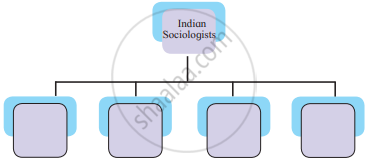Topics
Introduction of Sociology
Contribution of Western and Indian Sociologists
- Introduction to Western Sociologists
- Auguste Comte (1798-1857)
- Emile Durkheim (1858-1917)
- Karl Marx (1818-1883)
- Abdul Rahman Ibn-khaldun
- Harriet Martineau (1802 – 1876)
- Durkheims’ Theory of Suicide
- William Du Bois (1868 – 1963)
- Marxian Theory of ‘Class Conflict’
- Introduction to Indian Sociologists
- Dr. G. S. Ghurye (1893-1983)
- Dr. M. N. Srinivas (1916-1999)
- Dr. Iravati Karve (1905-1970)
Basic Concepts in Sociology
- Introduction of Society
- Definition of Society
- Characteristics of Society
- Introduction of Community
- Definition of Community
- Elements of Community
- Introduction of Social Group
- Definition of Social Group
- Characteristics of Social Group
- Types of Social Group
- Concept of Social Status
- Types of Social Status
- Concept of Social Role
- Social Role Related Concept
- Concept of Social Norms
- Types of Social Norms
Social Institutions
- Concept of Social Institutions
- Characteristics of Social Institutions
- Concept of Family
- Functions of Family
- Forms of Family
- Twenty-first Century Families
- Concept of Marriage
- Forms of Marriage
- Family, Marriage and Kinship
- Economy and Work
- Concept of Education
- Types of Education
- Importance of Education
- Education and Social Division
Culture
Socialization
Social Stratification
Social Change
Notes
Dr. Iravati Karve:
Irawati Karve (1905-1970) was born in Burma and educated in Pune. A Master’s degree in sociology from Mumbai in 1928 and a doctoral degree in anthropology from Berlin in 1930 marked the onset of a long and distinguished career of pioneering research. Karve, a researcher of international repute, known to have nurtured social sense in people and achieved supremacy in the fields of sociology, cultural and physical anthropology, was also an excellent author and a fine example of women’s liberation.
Karve had knowledge of both social and physical anthropology – a combination which in these days of specialization only a few of us can claim. Beyond that, her acquaintance with Sanskrit and Pali literature enabled her to write on Indian kinship diachronically, particularly as she has gone to the trouble of learning to read Tamil for the sake of the light which early literature can through on South Indian systems.
She wrote in both English and Marathi, on academic subjects as well as on topics of general interest, and thus commanded an enviably wide circle of readership. Whether through her Hindu Society: An Interpretation, a scholarly treatise in English, or through Yuganta: The End of an Epoch, her study in Marathi of the characters and society in the Mahabharata, we obtain ample illustration of the range and quality of her mind.
But, at the international level, she is known for her study of various social institutions in India, and through her book on Kinship Organization in India, which first appeared in 1953 and marked a notable advance in our understanding of the structure of Indian society. It has not been superseded by any other general comparative treatment of Hindu kinship in India as a whole, and a reissue is more than overdue.

